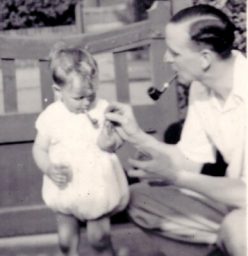The significance of surnames to genealogy and family history.
Hereditary surnames came into use in Britain during the 13/14th century having been introduced by the aristocracy. Surnames became common amongst everyday people in the 1400s until 16th century when Henry VIII ordered that births be registered under the fathers’ surname.
Surnames can provide a wealth of information regarding its origin such as: occupation, the area your family originate, a person’s physical description, the description of their features or their ancestral name.
I have researched my family name which is Keenan and discovered it originates from Ireland. Keenan in the Anglicised spelling of Cianan further back up by my discovery of it being spelt as Caanan on my 5 x gt grandfathers marriage record. The difference in spelling is due to a couple of factors – the way the name was pronounced (an Irish accent) and the way the name was interpreted (in Cheshire) during a time when many if not most people were illiterate – therefore depending on the writers interpretation of how a name is spelt!
By researching the distribution of a surname, you can establish if it concentrated in one area of the country, if so, this can indicate that the surname originates from one family and most if not all people with that surname are descended from the same family.
Ancestral or patronymic or matronymic surnames are variation of the fathers or mothers’ forenames where it was common e.g. John son of William became John Williamson or Williams or another variation of William.
Surnames and nicknames have links with geography, local and personal history, occupations and religion too. Surnames can indicate a geographical location that the family originate from and could have their town as the surname this could indicate if they are living elsewhere that this is where they were from.
Not everyone living in a town could have the town as their surname, so in some instances they used their name of the house, farm or landowner to identify themselves. As well as town names as surnames some people would become known according to where they lived to avoid confusion so someone living near a hill could be known with the surname of Hill.
An individual’s personal traits or appearance can also aid in the creation of a surname based on a nickname such as someone who is tall, short, slim, overweight or their complexion. Names were also created from a person’s qualities such as their morals or their characteristics such as a strong or weak person, some even poked fund at or ridiculed a person.
Often a person’s occupation determines their surname, nowadays Wright is a common surname this could originally have been Wheelwright of Wainwright, similarly Smith could have been Goldsmith, it became easier to shorten long names originating from occupations in this fashion.
Other names such as King, Lord, Pope etc could lead you to believe that there is a link to a person of this title when in actual fact it is often discovered that these are linked to nicknames such as a person who went round the locality as though he owned the village “lording” it about could become known as Lord, ridiculing him. It could also originate from the fact that a person had acted in that role in a play in the past.
How can you trace a surname – contemporary, old or common.
There are many websites online that you can use to research a surname, some show the distribution of the surname indicating where the name is more prevalent such as the website Public Profiler GB Names which shows you distribution in 1881 and 1998 – once you have found the name it will also show you the classification of the name whether it is based upon location, nickname or occupation.
This website would be particularly useful in tracing a more unusual surname. I used the surname Critchley which demonstrated in 1881 that the name was concentrated mainly in the north west of the UK, however searching again in 1998 showed it had spread around the UK. Other stats available on this website show frequencies of names per million showing if the name is more or less popular comparing 1998 to 1881.
There are also many other websites dedicated to surname studies. Some such as Ancestry have forums dedicated to surnames where people can discuss that particular surname and their relatives with that surname. There are a vast array of other sources in relation to surnames too – telephone directories, census returns, birth marriage and death records all showing a surname and a location.
Hearth Tax Records from the latter half of the 17th century are invaluable as they provide name, address, occupation and an indication of wealth based upon how many hearths a person had in their property. The records taken twice a year also showed how families moved around and how their income changed as in some years that may have been recorded as being exempt from payment as they were classed as poor. What is more relevant is that this set of records is one of the earliest sets of records showing the distribution of surnames and they can be tracked showing where the surnames originated which combined with the place they are recorded may also give an indication of how they came by their surname such as occupation etc.
So a little fun – think about the surnames below – where did they originate?
Shufflebottom Littlejohn
Fox Kidd
Grainger Shearer
Mansfield Gloster
Meek Makepeace
Pitt Castle
The list goes on………………………..
Now think back to your childhood when you were at school – whose name did you giggle at? Now where do you think it came from?!
